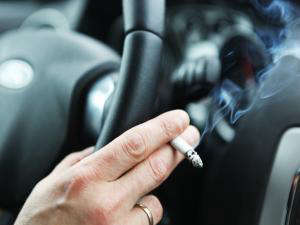
By James Ward, PA
Health Minister Robin Swann has laid out plans to ban smoking in cars when children are present.
Those in breach of the proposed legislation would be liable for fines of £50.
The sale of so-called e-cigarettes to those aged under 18 would also be banned under the proposals.
Mr Swann said: “The use of tobacco continues to be a primary cause of preventable ill health and premature death in Northern Ireland.
“It is vital that we maximise our efforts to reduce smoking prevalence and protect people, particularly children, from the effects of second-hand smoke.”

Health Minister Robin Swann
Legislation is already in place which bans smoking in certain premises, places and vehicles including on public transport and in work vehicles used by more than one person.
The proposed new regulations would extend the current smoke-free provisions to private vehicles where children are present, when there is more than one person in the car and the vehicle is enclosed.
It is also proposed that failing to prevent smoking in a smoke-free private vehicle will be made an offence.
Mr Swann added: “Children and young people are more vulnerable to the harmful effects of second-hand smoke as they breathe more rapidly and inhale more pollutants per pound of body weight than adults.
“The Royal College of Physicians has reported that this can lead to increased risk of asthma, lower respiratory infections, middle ear disease, bronchitis, bacterial meningitis and sudden infant death syndrome, as well as reduced respiratory function.
“These planned regulations will play an important role in protecting children from the harms of nicotine addiction and tobacco use.
“I anticipate that, subject to Assembly approval, these regulations will be operational early next year.”
Plans are also under way to prevent the sale of nicotine inhaling products, such as e-cigarettes, to anyone aged under 18, under the Health Miscellaneous Provisions Act (NI) 2016.
It will also be an offence to purchase such products on behalf of a child.
These offences mirror current offences relating to tobacco sales.
Mr Swann said: “Nicotine is highly addictive and, according to the World Health Organisation, exposure to nicotine whilst still in adolescence can lead to long-term consequences for brain development.
“In addition to the potential long-term health implications of e-cigarette use by teenagers, there are also concerns that they may act as a gateway into smoking.
“Youth smoking prevalence in Northern Ireland has been steadily decreasing in recent years, and I do not wish to see this trend reversed because young people, who may not have been induced initially to smoke tobacco, instead become addicted to nicotine through e-cigarettes.”
Failure to pay fines for smoking in a vehicle while a child is present could result in the matter being referred to court.


 More than 5,000 NI children set to spend Christmas in temporary accommodation
More than 5,000 NI children set to spend Christmas in temporary accommodation
 No evidence of police collusion in 1978 La Mon bombing
No evidence of police collusion in 1978 La Mon bombing
 Sex offender who targeted girls online across the UK jailed for 27 years
Sex offender who targeted girls online across the UK jailed for 27 years
 Pre-trial rulings due in Bloody Sunday prosecution of Soldier F
Pre-trial rulings due in Bloody Sunday prosecution of Soldier F
 ‘Worst-case scenario’ could delay Belfast maternity hospital by four years
‘Worst-case scenario’ could delay Belfast maternity hospital by four years